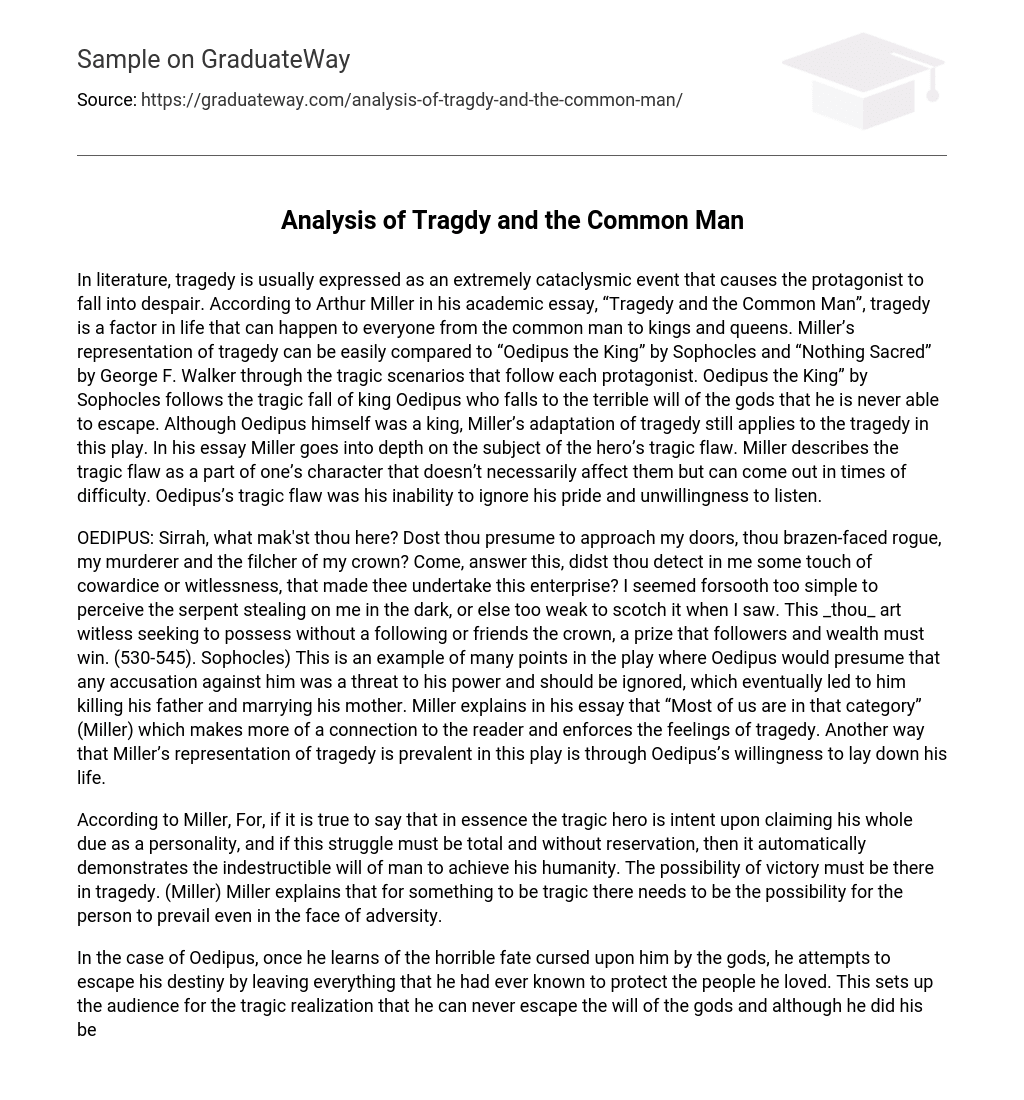The portrayal of tragedy in literature often involves a catastrophic event that leads the protagonist into despair. Arthur Miller’s essay, “Tragedy and the Common Man”, explains how tragedy can affect anyone, regardless of their status. This perspective on tragedy is comparable to Sophocles’ play “Oedipus the King” and George F. Walker’s work “Nothing Sacred”, as both narratives depict tragic circumstances for their protagonists.
In “Oedipus the King”, Sophocles presents the downfall of King Oedipus who is unable to escape his fate due to the unforgiving will of the gods. Despite being a king, this play aligns with Miller’s concept of tragedy. In his essay, Miller explores the idea of a tragic flaw in a hero, which is defined as a character trait that may not always affect an individual but can manifest during challenging times. Oedipus’s tragic flaw was his inability to disregard his pride and refusal to listen to advice.
OEDIPUS: Sir, why did you come here? Do you have the audacity to approach my doors, you shameless rogue, my murderer and the thief of my crown? Inform me, did you believe I was a coward or a fool that you attempted this task? Maybe you assumed I was too naive to perceive the serpent creeping towards me in the darkness or too feeble to defend myself once I saw it. It is foolish of you to aspire for the crown without supporters or riches, as these are essential for obtaining such a prize (530-545, Sophocles). This is just one instance in the play where Oedipus disregards any accusations against him as threats to his power, ultimately resulting in him killing his father and marrying his mother. Miller elucidates in his essay that most people can identify with this mindset (Miller), further establishing an emotional connection between readers and the tragedy. Another way Miller’s portrayal of tragedy manifests itself in this play is through Oedipus’s readiness to sacrifice his own life.
Miller explains that in tragedy, the tragic hero is resolute in asserting their complete identity and their struggle reflects humanity’s unwavering determination to achieve their true essence. According to Miller, there must always be the possibility of triumph even when faced with adversity.
Oedipus, upon learning his grim fate from the gods, tries to defy it by leaving behind his familiar life to protect his loved ones. This heartbreaking revelation shows that he cannot escape the desires of the gods, and despite his best efforts to shield his parents, it ultimately leads to his downfall. Therefore, Miller’s concept of tragedy applies perfectly to the calamity that befalls Oedipus the king. Another example where Miller’s depiction of tragedy is relevant can be found in George F. Walker’s “Nothing Sacred”.
The play recounts the story of Bazarov and his aspiration to bring about social change in Russia. Despite being of humble origins, Bazarov’s life is viewed as tragic. Miller argues that tragedy lies in the fact that even ordinary individuals can attain great significance if they are willing to give their all to fight for their rightful place in society (Miller). Throughout the play, Bazarov tirelessly strives to promote his vision of a new Russia, where there is equality and the serfs are no longer oppressed.
Bazarov is willing to lead Russia into a new era, undergoing a complete personality change and sacrificing much to prepare himself for this role. According to Miller, tragedies often revolve around kings because they have more at stake. This applies to Bazarov, despite not being a king or wealthy, as he stands to lose a great deal if his plan to transform Russia fails. Similar to Oedipus, Bazarov possesses a fatal flaw that ultimately leads to his premature demise.
Bazarov, a nihilist, rejects all beliefs and superstitions, including traditions. When Pavel challenges him to a duel, Bazarov does not consider it seriously due to his nihilist mindset. Pavel insists on doing it properly, desperate to prove himself, but Bazarov dismisses him with contempt. In the midst of their confrontation, Pavel shoots Bazarov, who is taken aback, clutching his chest. Disregarding Pavel’s “Primitive” traditions leads Bazarov to underestimate the seriousness of the duel and ultimately results in his shooting and eventual death. (Bazarov, Pavel 248)
Miller explains that for tragedy to be effective, the character must not be considered “flawless” by the audience. Hence, “Nothing Sacred” exemplifies how tragedy can impact the everyday individual. In summary, Miller’s thesis is supported by Sophocles’ “Oedipus the King,” depicting the tragic tale of a king, and George F. Walker’s “Nothing Sacred,” portraying the tragic narrative of an ordinary person. These narratives demonstrate that while tragedy is typically depicted through the experiences of royalty, it can also be applicable to anyone’s life.





